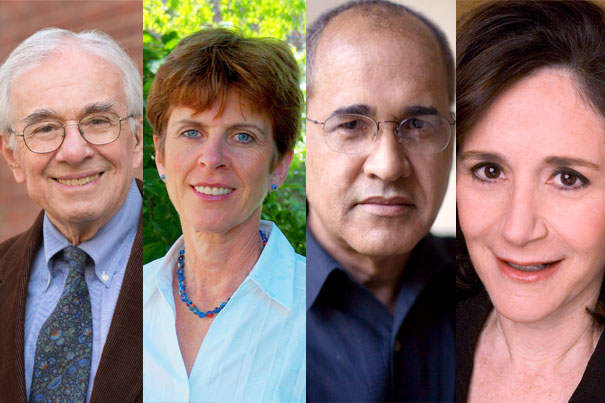
Everett Mendelsohn, Ph.D. ’60 (from left), Louise Richardson, Ph.D. ’89, Arnold Rampersad, Ph.D. ’73, and Sherry Turkle, A.B. ’69, Ph.D. ’76, are receiving the Centennial Medal from the Graduate School of Arts and Sciences.
GSAS honors four alumni
Centennial Medal celebrates achievement of a select group
The Centennial Medal is the highest honor awarded by the Graduate School of Arts and Sciences (GSAS), given annually on the day before Commencement to celebrate the achievements of a select group of Harvard University’s most accomplished alumni. The medal was first awarded in June 1989, on the occasion of the 100th anniversary of the founding of GSAS.
Everett Mendelsohn
Everett Mendelsohn, Ph.D. ’60, history of science, is emeritus professor of the history of science at Harvard University, where he has been on the faculty since 1960. He is a pioneering figure in the history of the life sciences, having founded the Journal of the History of Biology in 1968. His work has also explored the social and sociological history of science, especially in the modern era. He is past president of the International Council for Science Policy Studies and has been deeply involved in the relations between science and modern warfare as a founder of the American Association for the Advancement of Science’s Committee on Science, Arms Control, and National Security, and of the American Academy of Arts and Science’s Committee on International Security Studies. Mendelsohn is the former master of Dudley House, the Graduate School of Arts and Sciences student center, and is a longtime advocate of the importance of mentoring at the graduate student level — so much so that the Graduate Student Council named its annual mentoring award in his honor. For decades, he has contributed to Middle East peace and reconciliation efforts, leading committees of the American Academy of Arts and Sciences and the American Friends Service Committee.
Arnold Rampersad
Arnold Rampersad, Ph.D. ’73, English, is professor of English and the Sara Hart Kimball Professor in the Humanities Emeritus at Stanford University. He is considered the leading biographer of African-American writers and cultural figures, and his body of work — which includes essential and groundbreaking studies of Ralph Ellison, Langston Hughes, and W.E.B. Du Bois, as well as a biography of Jackie Robinson and a memoir collaboration with Arthur Ashe — was recognized with the National Humanities Medal in 2010 and with the 2012 Anisfield-Wolf Book Awards Lifetime Achievement Award, a juried competition recognizing contributions to our understanding of racism and diversity. Rampersad joined the Stanford faculty in 1975 and stayed until 1983, when he left for a position at Rutgers University. He went on to teach at Columbia and Princeton, before returning to Stanford in 1998. His teaching and research focus on 19th- and 20th-century American literature; American autobiography; race and American literature; and African-American literature. He is an elected member of the American Academy of Arts and Sciences and the American Philosophical Society, and he held a MacArthur fellowship from 1991 to 1996.
Louise Richardson
Louise Richardson, Ph.D. ’89, government, is the principal and vice chancellor of the University of St. Andrews in Scotland, a title equivalent to that of president at U.S. institutions. She was an assistant and then associate professor of government at Harvard for 12 years and head tutor in the department for eight of those years, responsible for overseeing the large undergraduate program. In 2001 she became executive dean of the Radcliffe Institute for Advanced Study and was instrumental in the transformation of Radcliffe into an interdisciplinary center promoting scholarship across a wide range of academic fields and the creative arts. In her scholarship and teaching, she has specialized in international security with an emphasis on terrorist movements, forming a reputation as a leader in the field when few other scholars were tuning in to its importance. For many years, she taught Harvard’s only courses on terrorism, including the large and popular undergraduate lecture course “Terrorist Movements in International Relations.” She is the author of “What Terrorists Want: Understanding the Enemy, Containing the Threat” (2006), the editor of “The Roots of Terrorism” (2006), and the co-editor of “Democracy and Counter-Terrorism: Lessons from the Past” (2007), among other books, journal articles, and book chapters. In 2011, she was appointed to the Scottish government’s Council of Economic Advisers.
Sherry Turkle
Sherry Turkle, A.B. ’69, Ph.D. ’76, sociology, is the Abby Rockefeller Mauzé Professor of the Social Studies of Science and Technology at the Massachusetts Institute of Technology (MIT) and the founder and director of the MIT Initiative on Technology and Self. She has been called “the leading anthropologist of cyberspace,” with a landmark body of work that explores how technology is shaping our society and ourselves. A licensed clinical psychologist and an expert on mobile technology, social networking, and sociable robotics, Turkle has been thinking and writing about people’s relationships with computers since at least as early as 1984; that year, her book “The Second Self: Computers and the Human Spirit” looked at how MIT students were beginning to use computers as metaphors for their own minds. She drew wide attention in 2011 with “Alone Together: Why We Expect More from Technology and Less from Each Other,” which argued that digital connectedness is impoverishing human relationships. She is also the author of “Simulation and Its Discontents” (2009) and “Life on the Screen: Identity in the Age of the Internet” (1995), among other books, edited collections, chapters, and articles. She is a sought-after media commentator and the subject of profiles in such publications as the The New York Times, Scientific American, and Wired.




